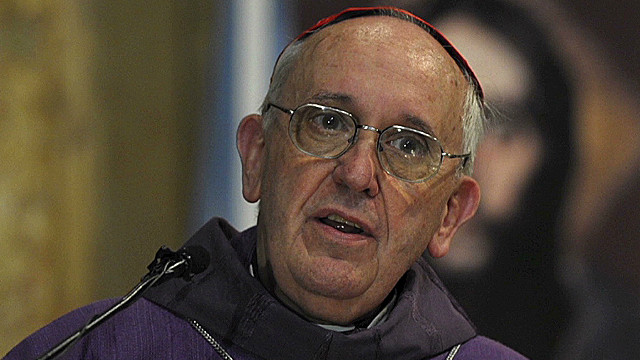From the Vatican to Buenos Aires, Catholics worldwide rejoiced when Cardinal Jorge Bergoglio became the new pope.
 2. He's not actually the first pope from outside Europe
2. He's not actually the first pope from outside Europe
He's the first Jesuit and the first Latin American in modern times to lead the world's 1.2 billion Catholics.
But in some ways, he's just a normal guy.
Here are five things to know about Pope Francis:
1. His name says a lot about him
Unlike other recent
pontiffs -- John Paul II, Benedict XVI -- Pope Francis doesn't have a
numeral after his name. That's because he's the first to take the name
Francis.
Why Francis?
St. Francis of Assisi was
born the son of a rich cloth merchant. But he lived in rags among
beggars at St. Peter's Basilica in Rome.
Those close to Pope Francis see similarities between the two men.
"Francis of Assisi is
... someone who turned his back on the wealth of his family and the
lifestyle he had, and bonded with lepers and the poor," said the Rev.
Thomas Rosica, the Vatican's deputy spokesman. "Here's this pope known
for his care for AIDS patients and people who are very sick. Who is
known for his concern with single mothers whose babies were refused to
be baptized by priests in his diocese.
"He scolded those priests last year and said, 'How can you turn these people away when they belong to us? '"
 2. He's not actually the first pope from outside Europe
2. He's not actually the first pope from outside Europe
Sure, Francis is the
first non-European pope in modern times. But back in the 8th century, a
Syrian -- Pope St. Gregory III -- led the church from 731 to 741 A.D.
We've also had popes
from Bethlehem (St. Evaristus, from 97 to 105 A.D.), Jerusalem (Pope
Theodore I, from 642 to 649) and modern-day Libya (Saint Victor I, from
189 to 199). Several other Syrians have also been pontiff in the last
few millennia.
Of course, the majority of popes have been Italian. But with Francis' appointment, the tide could be shifting to outside Europe.
3. He's a pope of the people
honor St. Francis of Assisi, an admirer of nature and a servant to the poor and destituten some ways, Pope Francis is just a normal guy.
"The new pope is a very
humble man," said the Rev. Eduardo Mangiarotti, an Argentine priest. "He
takes public transport every day."
He also chose to live in
an apartment instead of the archbishop's palace, passed on a
chauffeured limousine and cooked his own meals, CNN Vatican analyst John
Allen wrote in a profile published by National Catholic Reporter.
In his first public act
as pontiff, Pope Francis broke with tradition by asking the estimated
150,000 people packed into St. Peter's Square to pray for him, rather
than him blessing the crowd first.
"He is a very simple
man," said Luis R. Zarama, auxiliary bishop of Atlanta. "It's very clear
from the way he approached the people and asked them to bless him and
pray for him. It's a beautiful sign of closeness and humility."
The pontiff broke with
another tradition by refusing to use a platform to elevate himself above
the cardinals standing with him as he was introduced to the world as
Pope Francis.
"He said I'll stay down
here," said Cardinal Timothy Dolan, archbishop of New York and the
president of the U.S. Conference of Catholic Bishops. "He met each of us
on our own level."
4. He comes with a side of controversy
Francis opposes same-sex marriage and abortion, which isn't surprising as leader of the socially conservative Catholic church.
But as a cardinal,
Francis clashed with the government of Argentine President Cristina
Fernandez de Kirchner over his opposition to gay marriage and free
distribution of contraceptives.
His career as a priest
in Argentina coincided with the so-called Dirty War -- and some say the
church didn't do enough to confront the military dictatorship.
As many as 30,000 people died or disappeared during the seven-year period that began with a coup in 1976.
Francis, in particular,
was accused in a complaint of complicity in the 1976 kidnapping of two
liberal Jesuit priests, Allen wrote. Francis denied the charge.
"The best evidence that I
know of that this was all a lie and a series of salacious attacks was
that Amnesty International who investigated that said that was all
untrue," said Jim Nicholson, former U.S. Ambassador to the Holy See.
"These were unfair accusations of this fine priest."
5. He faces a host of challenges ahead
Francis takes the helm
of a church that has been rocked in recent years by sex abuse by priests
and claims of corruption and infighting among the church hierarchy.
He may need to find a
way to draw new Catholics into the church where it is in decline, said
Phillip M. Thompson, executive director of the Aquinas Center of
Theology at Emory University.
And he'll also need to
find ways of working with shifting viewpoints among Catholics. In the
United States, for example, 90% of Catholics are using contraception and
82% think it is morally permissible.
"The church has
conservative positions on human sexuality, bioethics, etc., but liberal
positions on issues such as economic regulation, the death penalty and
immigration," Thompson said. "A church divided against itself seems
unlikely to renew our political or cultural structures. whats your take on this?


0 comments:
Post a Comment